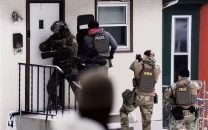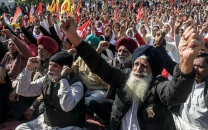California Wildfires vs Gaza Siege: Selective empathy or irony of karma?
Wildfire tragedy in California sparks outrage over political hypocrisy and selective empathy.
1736605969-0/Copy-of-Untitled-(7)1736605969-0-640x480.webp)
The wildfires in California have scorched vast areas, destroying tens of thousands of structures and claiming at least 10 lives. Around 180,000 people have evacuated, and a further 200,000 remain under warning.
These fires, fanned by dry winds, continue to rage across Southern California, affecting Los Angeles and neighbouring regions.
Amid this tragedy, Israel extended a message of solidarity, but the gesture has faced significant criticism online.
"Our hearts are with the residents of Southern California as wildfires continue to impact communities," the embassy wrote on X. "Israel stands in solidarity with those affected, and we send strength to the brave firefighters and first responders working tirelessly to protect lives and homes."
The post sparked backlash, with social media users questioning Israel's sincerity in light of its ongoing 15-month military occupation in Gaza. Over 46,000 Palestinians, mostly women and children, have been killed since October 2023, according to Gaza Health Ministry reports.
One user commented, "You burn hospitals and refugees on a live stream," while another asked, "Why does this heart not beat for Palestine?"
Social media users not only criticised Israel’s message of solidarity regarding the California wildfires but were also quick to draw stark comparisons between the devastation in California and Gaza. Many posts shared before-and-after images of neighbourhoods ravaged by the wildfires alongside similar visuals from Gaza, illustrating the destruction caused by IDF.
Photo: Maxar Technologies East Altadena Drive in Altadena, Calif. Before Jan. 6, 2025 Vs. After Jan. 8, 2025
Gaza in comparison
Moreover, social media users wasted no time in claiming it was "karma" for celebrities and others who had openly supported Israel amid its military actions in Gaza.
Actor James Woods, known for his vocal support of Israel, saw his Los Angeles home destroyed in the fires. Social media users quickly pointed out the irony, with one commenter remarking, "Woods supported policies that razed homes in Gaza, and now he watches his own home burn."
Palestinian poet Mosab Abu Toha, expressed outrage over selective empathy. Writing on X, Abu Toha stated: “How dare you cry on air?!”
He elaborated: “When our house was bombed on October 28, 2023, I had no home or safe place to go, nor the luxury to watch it on TV. I still can’t return to the ruins of my house because my city is occupied.”
Adding to the discourse, prominent American imam and activist Omar Suleiman highlighted the stark disparity in global empathy. In a post on X, Suleiman wrote:
“Praying that God protect the lives and properties of innocent people in Los Angeles and beyond. But can't help but notice this. The people of Gaza continue to be exterminated by the cruel in houses of power, with the support of the cruel who feel invincible in their mansions.”
Similarly, Jamie Lee Curtis, who previously faced backlash for posting an image supporting Israel (later revealed to depict Palestinian children), found herself at the center of criticism again. After wildfires consumed her property, posts flooded in highlighting the perceived hypocrisy of her stance. One user wrote, "Curtis cries for her house, but did she cry for the families in Gaza she indirectly supported displacing?"
Diane Warren, who lost her long-time Los Angeles residence, also became a target of online activists. Despite her outspoken solidarity with Israel, her personal tragedy was met with comments such as, "Praying for her house but not for thousands of Palestinian homes bombed to rubble."
The wildfires come amid broader scrutiny of US government spending. Some users even pointed out that in the weeks before wildfires swept across Los Angeles, budget cuts were undermining the city’s emergency preparedness.
The city council slashed $17.6 million from the Los Angeles Fire Department’s (LAFD) 2024-25 budget compared to the previous fiscal year, representing a 2% reduction.
This included a $7 million cut in overtime hours and the elimination of 58 positions. Crowley noted in a December 4 memo that these reductions significantly limited the department’s ability to train for and respond to large-scale emergencies.
A recent report from Brown University’s Watson Institute revealed that the US has allocated $22.76 billion for military operations in the Middle East, including $17.9 billion for Israel’s war in Gaza.
The discourse wasn’t confined to social media. Former Iranian Foreign Minister Mohammad Javad Zarif also commented on the situation, linking the destruction in California to the devastation in Gaza. On X, Zarif posted, “Grim footage out of California is reminiscent of ravaged homes, schools, and hospitals in Gaza.”
While extending sympathy to Californians, Zarif criticized the US for its continued support of Israel, attributing the destruction in Gaza to American-funded military actions. “Sympathy for Californians is humane—especially since so many there supported Gazans who lost everything to Israeli brutality,” he wrote.
While the sympathy goes with the people of California who are enduring the devastation of the wildfires, the response from social media users has undoubtedly grabbed attention. Their criticism highlights a growing sense of frustration over the ‘selective empathy’ displayed by certain public figures and the political implications surrounding global tragedies.
For many, the wildfires are seen as a personal tragedy that deserves empathy and support, yet this same level of compassion is often absent when it comes to the suffering in Gaza.
Social media, in this case, acts as a powerful lens that magnifies these contradictions. The viral backlash against celebrities like James Woods, Jamie Lee Curtis, and Diane Warren, who have publicly supported Israel while also suffering personal losses, has sparked a deeper conversation about how empathy is selectively given based on political alignments or proximity to tragedy. It is arguable that while public figures may express sorrow for those in California, their past stances on Gaza expose a profound disconnect when it comes to acknowledging the scale of suffering in Palestine.
In this polarised environment, the response to both calamities is often framed through a political lens, leaving many questioning whether the empathy extended is truly universal or dependent on political and ideological convenience.



















COMMENTS
Comments are moderated and generally will be posted if they are on-topic and not abusive.
For more information, please see our Comments FAQ